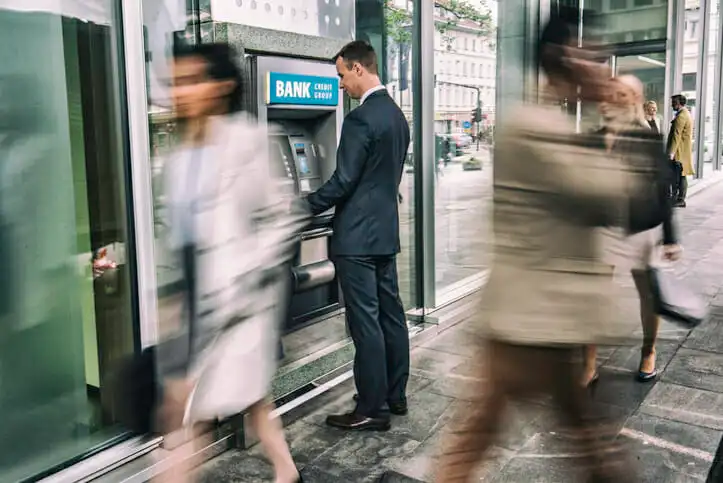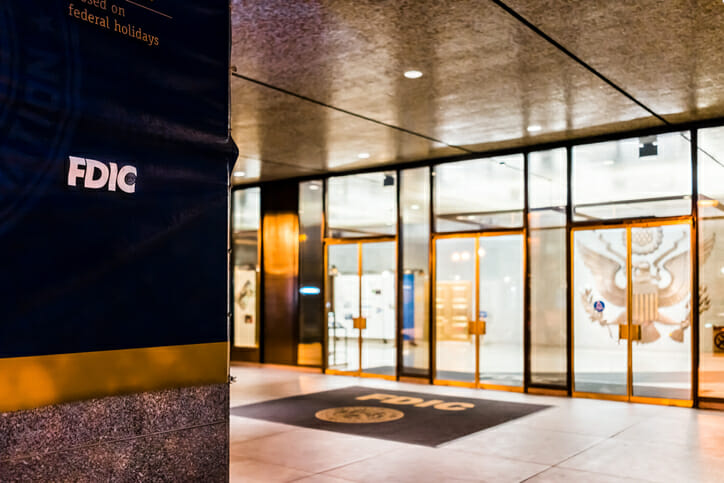If you have money in a checking, saving or other depository account, it is protected from financial downturns by the FDIC. Beyond that, investment products are more exposed to risk, but you can still take some steps to protect yourself. Here’s what you need to know. A financial advisor can help you create a financial plan for your needs and goals during an economic depression.
Deposits Are Protected by the FDIC
This is overwhelmingly the main form of protection that consumers have in case their banks fail due to an economic downturn or other issue.
The Federal Deposit Insurance Corporation (FDIC) is a semi-private organization that was created in the wake of the Great Depression. It insures depositor funds held by depository banks. This is as opposed to investment banks, which are banks that do business by purchasing and trading securities.
If your bank fails, the FDIC pursues two options: First, it attempts to sell the failing bank to a healthy institution. This is the FDIC’s preferred method and the most common. In fact, often depositors don’t even know that their bank has failed. They simply receive notice that their funds are now held by a new institution.
If the FDIC can’t sell the failing bank, then it reimburses depositors for money that they lost. Each individual can receive up to $250,000 from the FDIC per ownership category and per institution they banked at. Readers should note that this is per individual-per institution, not per account. So if you have $300,000 spread across a checking account and a savings account with a single bank, you could lose up to $50,000 in case of total failure.
Ownership categories refer to legal category in which you hold funds. The most common are:
- Individual, meaning that you own the account outright;
- Joint, meaning that you share ownership of the fund with one or more people;
- Qualifying retirement accounts, meaning that if you hold funds on deposit as part of a retirement account, it can be protected by the FDIC;
- Business accounts held in the name of a registered business entity.
For example, say a married couple wanted to maximize their FDIC protection. They could keep $250,000 in a joint savings account, then they could each individually put another $250,000 in individual savings accounts. Their joint savings account would be protected up to the cap of $250,000, as would each of their individual accounts, leading to $750,000 in total household protection. (The joint savings account would be insured as a single account, with $250,000 in protection, not on the basis of its multiple owners.)
Finally, it’s important to note that not every bank is necessarily FDIC insured. Most are, or in some cases like credit unions they are insured by an equivalent program. However this isn’t universal, and particularly in more experimental cases like decentralized finance or online-only banks an institution may not have depositor insurance. You should check to make sure that your bank has the FDIC seal if this concerns you.
The FDIC covers depositor products only. Most often, this includes:
- Checking accounts
- Savings accounts
- Money market accounts
- Certificates of deposit
This does not include investment products. Even if you lose money from something relatively secure like a bond the FDIC will not reimburse you. Nor will it necessarily reimburse you for funds held in an investment account or by your brokerage. If you have cash holdings with an investment institution, your protection will depend entirely on the details of that institution. In particular, you are most likely to be protected if your broker deposits cash funds with an FDIC-insured bank.
Banks Tend to Fail Rarely

It’s rare for consumer money to actually be at risk with a depositor bank. In addition to the fact that the FDIC is usually successful when it attempts to sell a failing bank, two factors serve to protect your money most of the time:
Inherent stability. While this is no legal guarantee, it is uncommon for consumer banks to fail and go out of business. This stability has several sources.
In part, this is because banks have gotten larger and more liquid in recent generations. This liquidity means that banks have more money on hand to protect against downturns. They also have fewer liabilities due to securitization and financial products. (Securitized products don’t always provide financial stability, but they do help consumers by moving risks away from consumer banks and into investment banks.)
In other part this is due to banking regulations passed in the wake of the Great Depression. While Congress weakened banking laws in the late 90’s and early 2000’s, banks still have strict regulations about using depositor funds to invest in securities and financial products.
Together, this means that banks don’t fail very often. Although it’s critical to understand that not often absolutely does not mean never. While uncommon, banks absolutely do periodically fail.
Insurance. Again, there is no legal guarantee here. However many banks have insurance or other protection that covers their depositors in case of failure. This is not a certainty, but in case your bank does fail it may have protection.
Funds in Excess of FDIC Protections
If you have more than $250,000 on deposit and are worried about your bank failing, you have two best options:
Spread money around. You can put your money into multiple institutions if you’re concerned about a single bank failing.
Remember, you receive up to $250,000 in protection per banking institution. By depositing your money with multiple banks, you both lower the risk of any single institution failing and get another basket of protection for each new account. While this may incur some fees, the costs are likely to be minimal as most banks offer extremely attractive products for six-figure deposits.
Diversify into investments. Investment products have an asymmetric risk profile to banks. While they can lose their value, you can’t lose your stocks or bonds just because your brokerage goes out of business. Even if your investment bank fails you still own your portfolio.
If you’re worried about banks failing, you can begin looking at safer investments as a place to put your money. Assets like Treasury bonds tend to do quite well during recessions for exactly this reason. They may not give a significant return, but you know you’ll get your money back.
Bottom Line

The FDIC protects consumers if their banks fail by insuring your money, whether in a savings account or a checking account, up to a quarter-million dollars. If that’s not quite enough protection for you, there are other ways to secure your money too.
Investment Tips During a Recession
- A financial advisor can help you make the right investment choices regardless of the market conditions. SmartAsset’s free tool matches you with up to three financial advisors who serve your area, and you can interview your advisor matches at no cost to decide which one is right for you. If you’re ready to find an advisor who can help you achieve your financial goals, get started now.
- The appropriate asset allocation is critical during a recession. Use SmartAsset’s free asset allocation calculator to make sure your portfolio aligns with your goals and risk tolerance.
Photo credit: ©iStock.com/krblokhin, ©iStock.com/vm, ©iStock.com/Geber86
